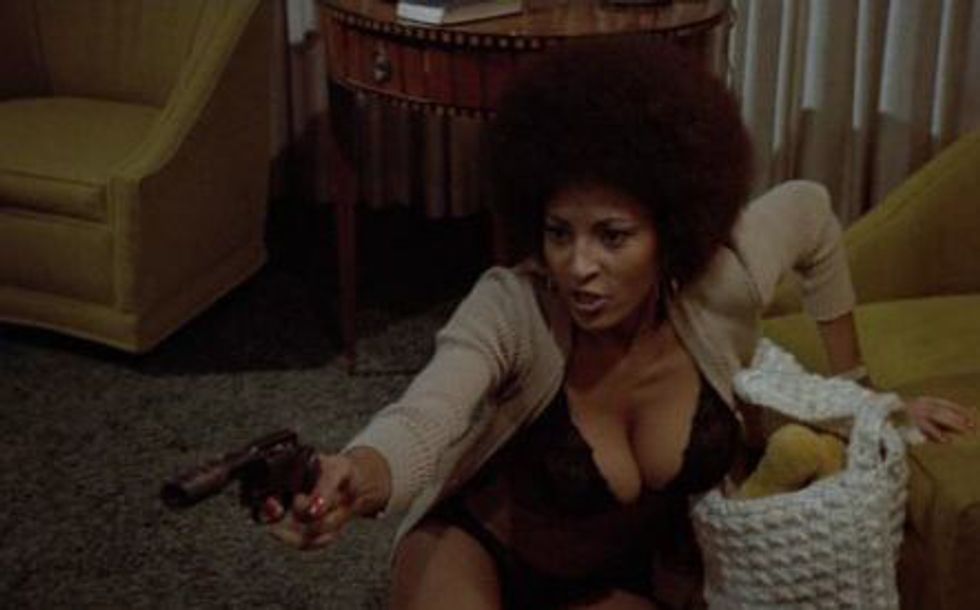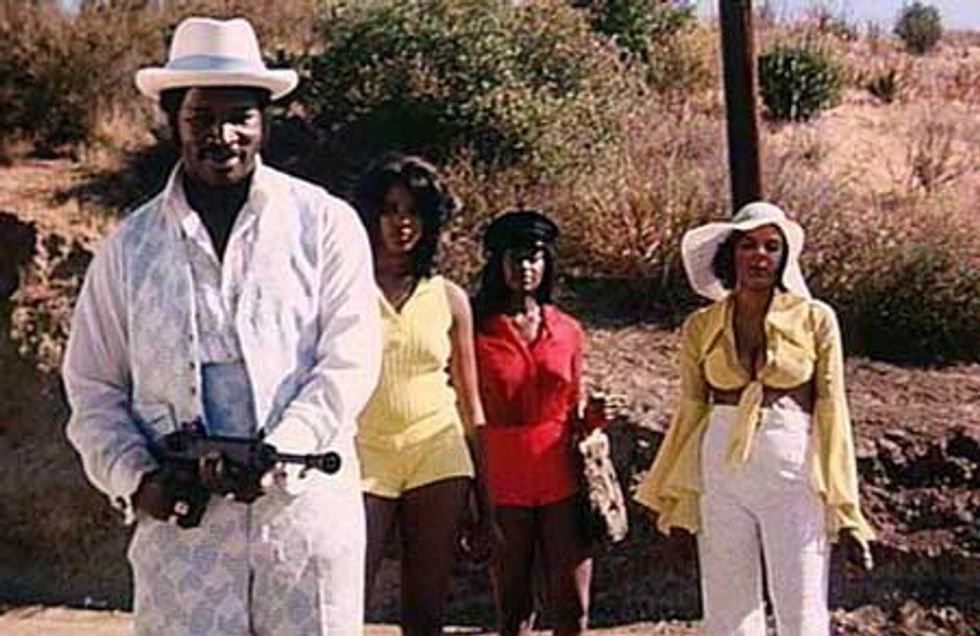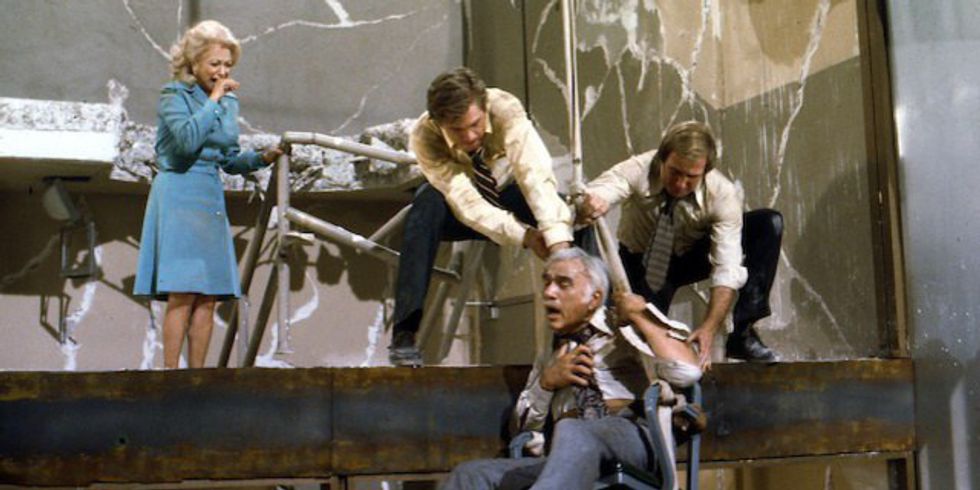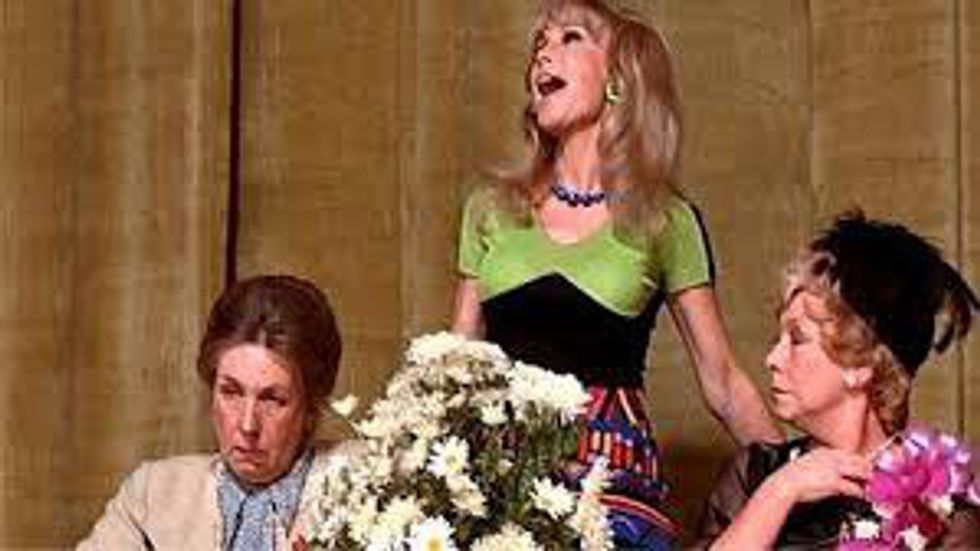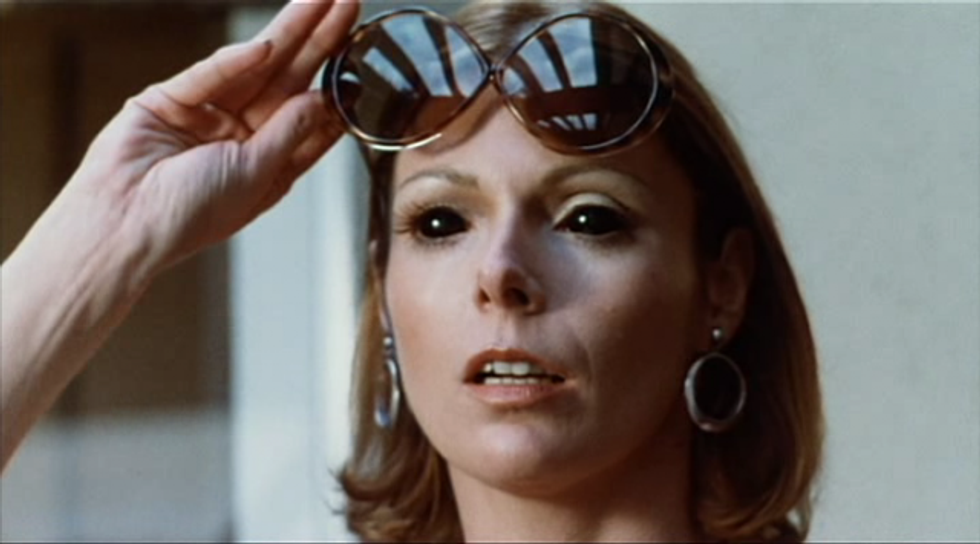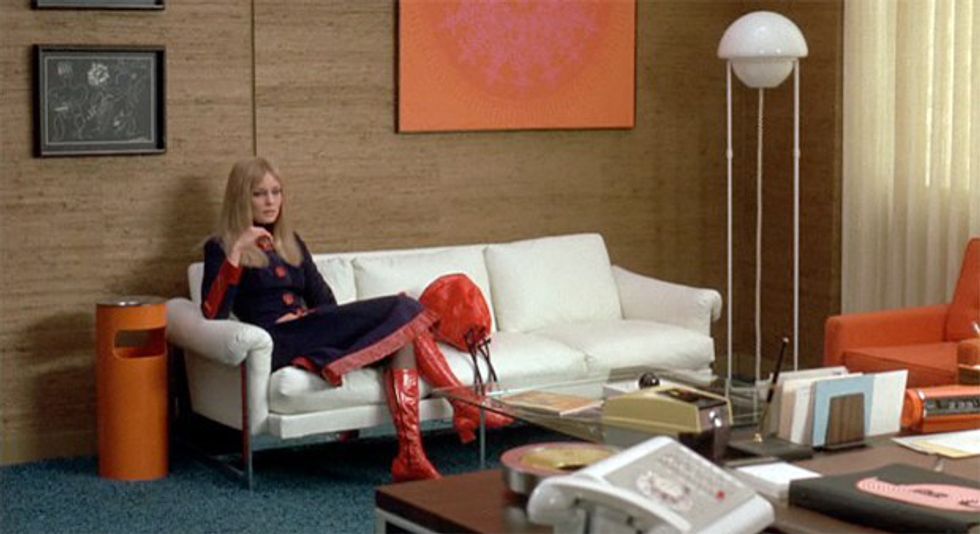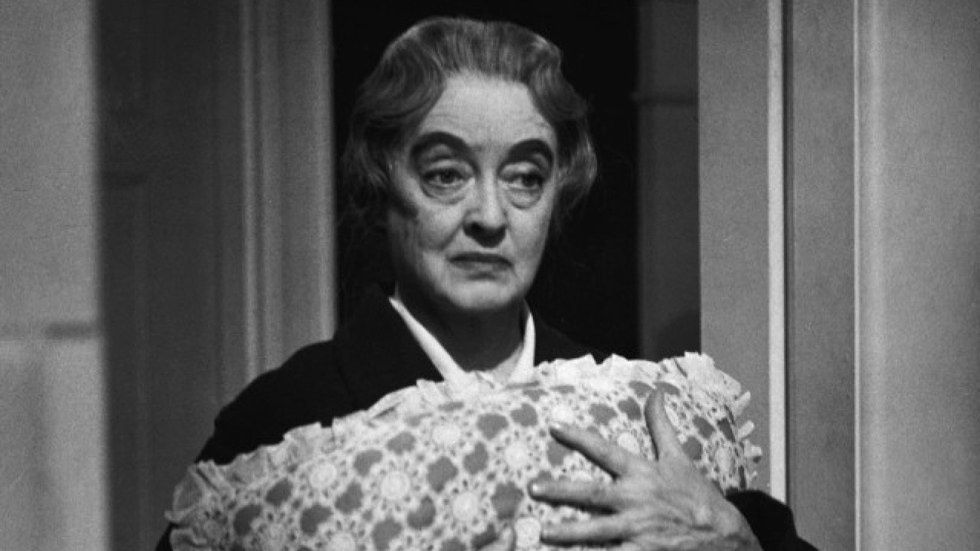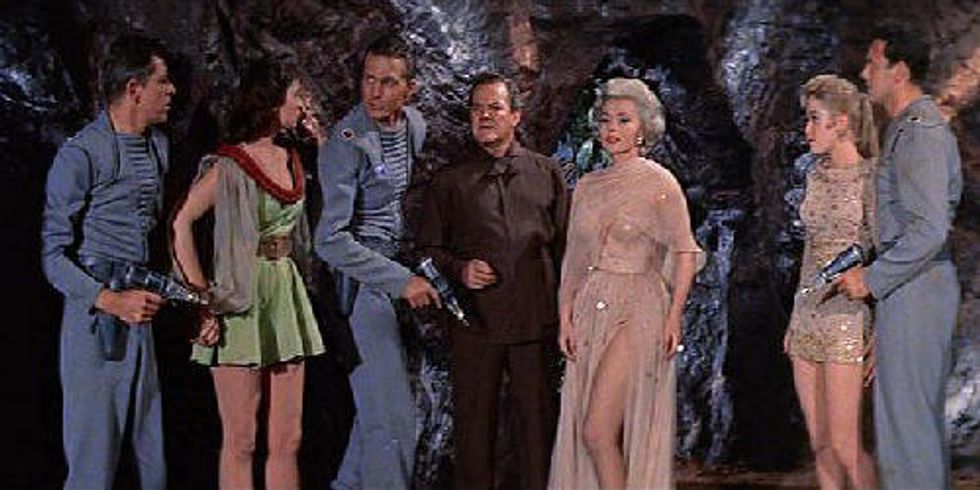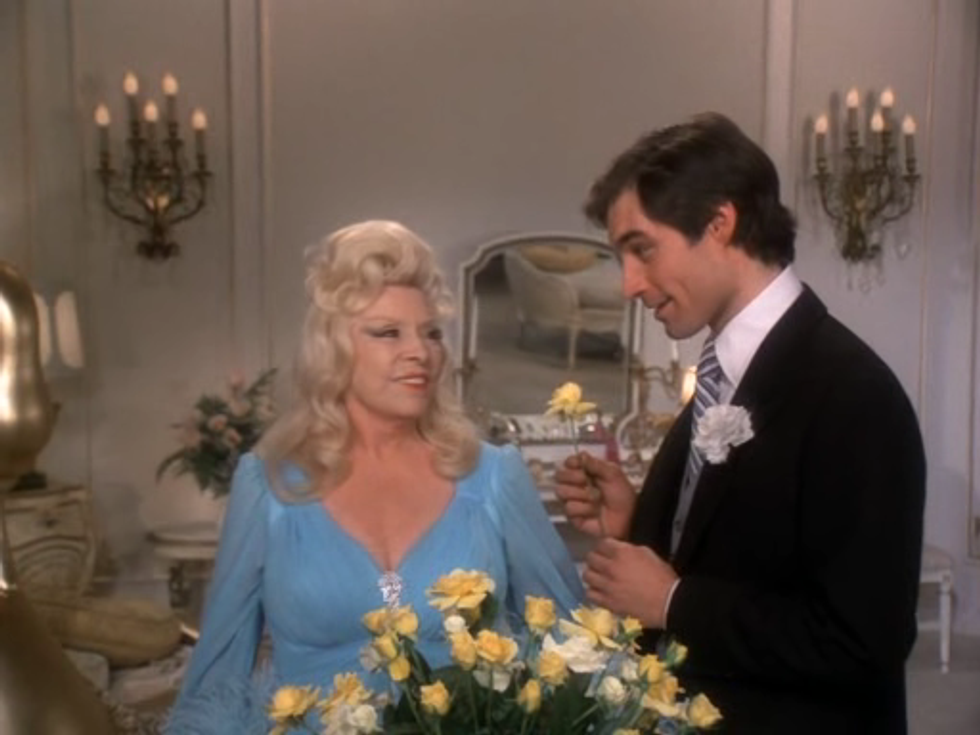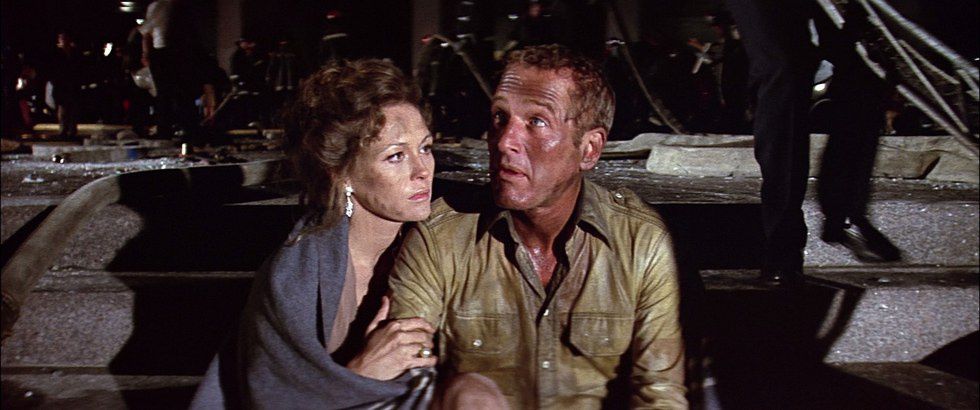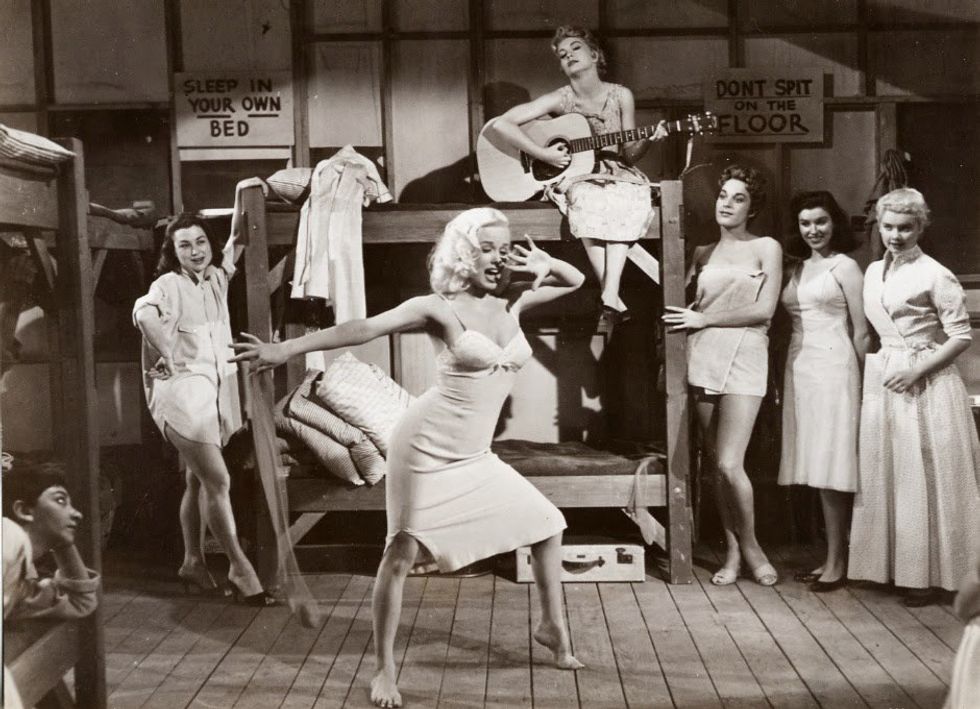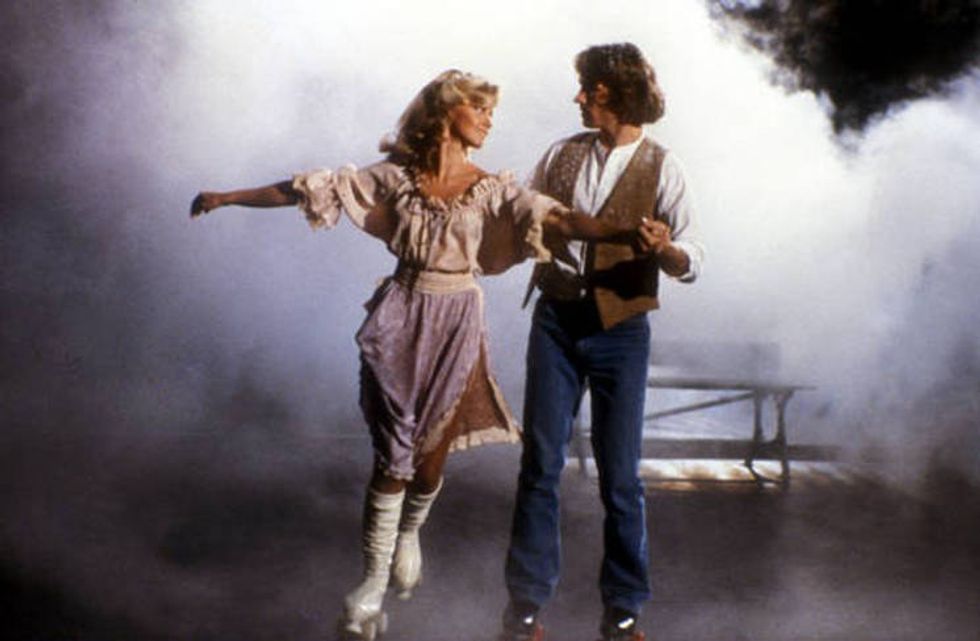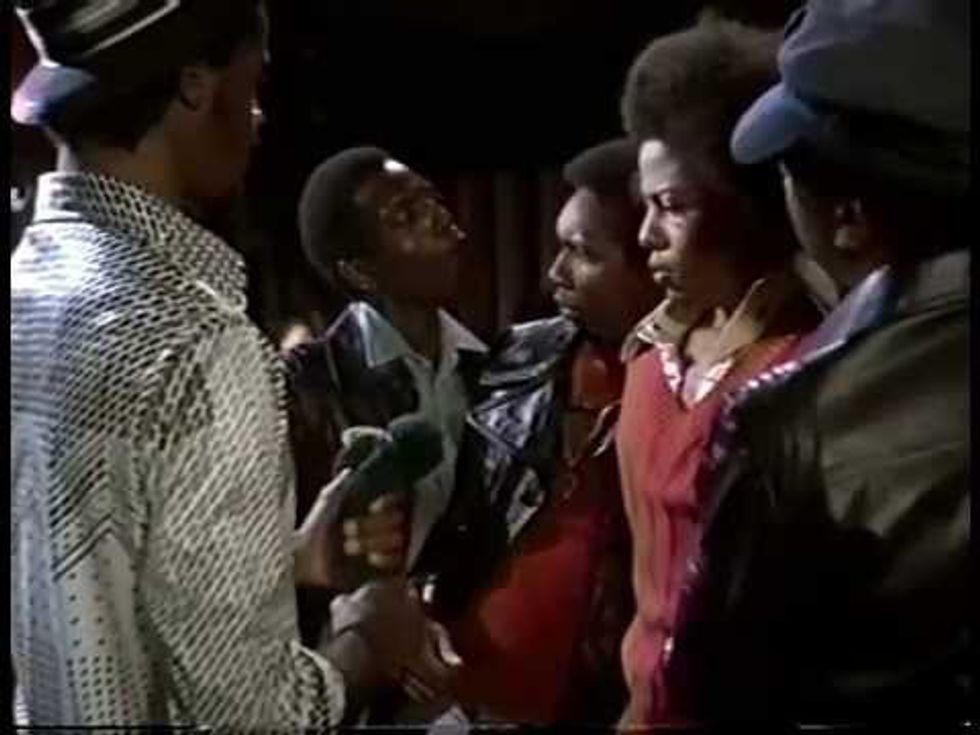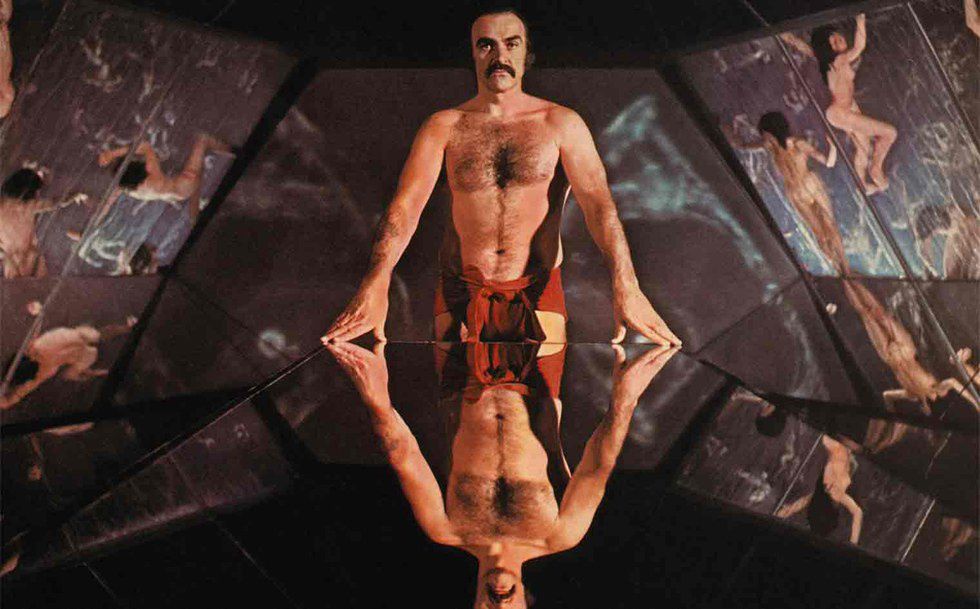A quality film earns its notoriety. Oscars are lavished upon it, it's held as a standard for others in its genre, it can even transcend mere culture, becoming noteworthy in the eyes of academia. But bad films, and I mean bad ones, gain an infamy all their own. Though they are mocked, they exude an undeniable charm that, while not Oscar-worthy, merits a lasting legacy.
An infamous bad film is hard to define. It cannot be bad in the sense that it is boring or mildly unpleasant. Katherine Heigl's films are bad, but they're not entertainingly awful. A bad film can have a large budget and an Academy Award winning cast or be made by a passionate group of delinquent friends on a budget of whatever-they-find-they-keep. A bad film can be a box office bomb or a smash hit, but the one constant must be an inverted effect on the audience. If the viewer is meant to laugh, they must cringe; if they should be cringing or screaming, they must be laughing. A bad film cannot have the desired effect but it must always, always, have a powerful one. It must cross the threshold of good taste, taking melodrama to an uncomfortable extreme. The following are the ABCs of absolutely awful films, required viewing for anyone who's had their fill of good taste and artistic sensibilities.
Airport 1975 (1974)
One of the most short-lived but memorable film genres was the disaster movie. During the '70s, when people apparently had no taste, a guaranteed moneymaker was lumping a group of stars together and pitting them against a swarm of killer bees or an earthquake or, in the case of the "Airport" series (which kickstarted this whole mess in 1970), plane accidents. In "Airport '75", the sequel, a small plane crashes into a big plane, killing the pilots and forcing a stewardess to fly the plane so the plane doesn't crash planeplaneplane. It's two hours of entertaining predictability and unintentional comedy, and they were popular enough to inspire the timeless parody "Airplane!"
Barbarella (1968)
Four years before she won her first Academy Award and pissed off America by posing with an anti-aircraft gun during a visit to Vietnam, Jane Fonda starred in "Barbarella", a European sci-fi "film" with a plot that centers around showing as much of her skin as possible. Barbarella must save a scientist from a deadly planet while narrowly escaping man-eating dolls, overloading a machine called "The Orgasmotron", and encountering a nearly-nude angel named Pygar. It's impossible to explain and will most likely leave you confused, but it's worth watching.
Coffy (1973)
To dismiss Pam Grier as a mere blaxploitation actress is to underestimate her. She will forever reign supreme as the Queen of Action Movies. There will never be another like her (although Tamara "Cleopatra Jones" Dobson gave her a run for her money) and it's easy to see why in "Coffy". Coffy, a nurse who moonlights as a drug-dealer-killing vigilante, lures prominent drug suppliers in with her looks and then strikes, a (no pun intended) black widow. The movie is wildly entertaining but is weighted by a wonderfully dated and vulgar script and an almost-poetic excess of gratuitous violence, with jive honkies dropping left, right, and center.
Dolemite (1975)
Blaxploitation movies need to come back and soon. There were heroes like Foxy Brown and Shaft, laughable villains like Blacula and Blackenstein, and Dolemite, one of the baddest of them all. He's a black, hip proto-Deadpool, cracking jokes while casually murdering the men who sent him to jail. Rudy Ray Moore, the man who plays Dolemite, was known for his "party records" during the '70s, extremely vulgar comedy albums that adults would play after the kids went to sleep. The result is a good-but-campy mix of comedy and violence, a style eschewed in nearly every other blaxploitation film.
Earthquake (1974)
People in disaster movies are always woefully unequipped to handle natural disasters, and "Earthquake" is no exception. In it, a 9.9 earthquake hits L.A., destroying the city and forcing the gigantic ensemble cast to figuratively and literally fight to survive. It may be a drawn-out, bloated mess of a movie but the corny acting, excessive action, and unbelievable plot will hold your attention.
Faster, Pussycat! Kill! Kill! (1965)
Filmmaker Russ Meyer was the King of Sexploitation Films, notoriously casting only well-endowed women in his cinematic garbage, but "Faster, Pussycat! Kill! Kill!" is impossibly hard to define. It can be easily summarized (three go-go dancers travel through the desert on a crime spree trying to find a stash of hidden money), but the film itself has, over the decades, escaped derision and ridicule to become an iconic cult classic, even being praised by many critics. Its influence on Tarantino's work is glaringly obvious, and though it's surprisingly good, it is nonetheless a bad film.
Grey Gardens (1975)
Jacqueline Kennedy Onassis will always be America's First Lady, a universal symbol of proper breeding and good taste. So imagine the public's surprise when, just a year shy of The Bicentennial, this documentary was released, detailing the squalid conditions and faded glory her aunt and cousin were living in. "Grey Gardens" is set on "Big" and "Little" Edith Bouvier Beales' formerly-resplendent manor in the Hamptons. The two women, once members of America's upper-crust, were reduced to living among garbage and mental deterioration. The documentary surpasses a tragic exposé, however, and enters comedic territory. The sheer insanity cancels out any poignancy, creating a jumble of pity and laughter and one of the greatest worst films of all time.
Harper Valley PTA (1978)
A film can glean inspiration from the most likely of places. "Clue", based on the board game, is a genuinely phenomenal movie. "Battleship", also based on the board game, is a monstrosity that should never have seen the light of day. And then there's "Harper Valley PTA", a movie based on Jeannie C. Riley's hit country song (from a decade prior). The song and movie tell the story of a single mother who, after having her parenting called into question by the puritanical titular PTA, publicly confronts them at their meeting, airing their scandalous dirty laundry member by member. The movie takes that funny and empowering song and stretches the one-note joke to the breaking point. By the end, you'll be rooting for the PTA and praying that CPS takes her daughter away.
Invasion of the Bee Girls (1973)
A mad scientist mutates women with radioactive bees to transform them into queen bees. In their newfound urge to mate, they have sex with several men, killing them in the process. It's a confusing film but an entertaining one, so laughably stupid that it makes "Norbit" look like "Casablanca". The special effects have all the quality of a middle school play and the gratuitous nudity gives this film a level of class comparable to that of a Reno strip club.
Johnny Guitar (1954)
It was at this point of her career that Joan Crawford made the transition from all-American movie queen to a terrifying caricature of herself. The eyebrows got thicker, the hair got shorter, the lips got wider, and the end result was a gruff saloon-keeper named Vienna being chased out of town by the locals in "Johnny Guitar". The film is a surprising mix of lyrical dialogue with cartoonish delivery, a pseudo-Western with retina-searing Technicolor and a subdued dignity. There's so much to say for and against this film but it remains a staple of bad filmdom.
Kiss Me Deadly (1955)
On one side, you have a sharp criticism of McCarthyism. On the other, you have an overly-exaggerated film noir. There are no big name actors, no huge gimmicks or cheap plots, just shadows, gunfights, and one hell of an ending. There are far better film noirs, with more nuanced acting and engaging plots, but none go so far over the top as "Kiss Me Deadly".
The Love Machine (1971)
There are a handful of living actors who are universally identified with the awful films of the '70s and, with all due respect, Dyan Cannon is one of them. She stars in this film adaptation of Jacqueline Susann's "The Love Machine" (skip to "V" on this list for Jackie's biggest hit/miss), a tawdry story of the sexual corporate ladder within the television industry overlaid with the gaudy horror that defined the 1970s. It's a joke of a film based on an even worse joke of a book wrapped up and served in a nightmarishly dated package.
Mommie Dearest (1981)
The story of the life of movie star Joan Crawford (star of Johnny Guitar, among many others), "Mommie Dearest" is a two-hour melodrama of biblical proportions. Based on her adopted daughter's novel about growing up with the abusive Oscar-winner, Mommie Dearest offers scenes which, had they been played with more restraint by Academy Award-winner Faye Dunaway, would be chillingly brutal, but instead are hilariously over-the-top. This film proves the phrase "there's nothing funny about child abuse" wrong in spades.
The Nanny (1965)
Nobody so perfectly embodies the cruelties of aging in Hollywood than Bette Davis, two-time Academy Award winner and one of the greatest actresses of all time, doing crappy horror movie after crappy horror movie in the '60s. In "The Nanny", she plays a nanny to a highly suspicious ten year old boy who refuses to eat meals she prepares and to be near her after his sister dies under her care. There's a poorly-written but amazingly-acted surprise ending that I won't ruin, but the film as a whole is mediocre and does everything in its meager power to compensate for that. There's also a noticeable lack of fluidity, giving the impression of a series of scenes rather than one cohesive movie. It's part of that ageless and aged "Grand Dame Guignol" genre (wherein a formerly world-famous actress like Bette or Joan Crawford or Shelley Winters runs around murdering people) and a prim, entertaining disaster dusted with talent.
One Million Years B.C. (1966)
It's an hour and a half of unbelievably bad special effects led by a not-quite-famous Raquel Welch who, in a torn and tattered leather bikini, gives this movie the most class it could ever hope to have. I shouldn't have to explain why this gripping story of prehistoric survival made the list.
Pink Flamingos (1972)
John Waters (you know, the guy who wrote "Hairspray") did not pioneer the trashy movie, but he made it into an art form all its own. He is universally regarded as the "King of Filth", and "Pink Flamingos", his magnum opus, vividly proves why. It, along with "Faster, Pussycat!" and "The Rocky Horror Picture Show", are the undisputed triumvirate of cinematic trash, cult movies so notorious that they transcend obscurity and make a marked impact on mainstream culture. This movie is not for the weak of heart, but it's a must see for any self-respecting film aficionado.
Queen of Outer Space (1958)
Oh God, this movie, this beautiful, horrible mess of a movie. The 50s sci-fi genre is so often parodied in pop culture that few people ever actually experience the joy that is post-World War II space movies. In "Queen of Outer Space", four astronauts land on Venus and discover that it's ruled by the tyrannical Queen Yllana. She has banished all men from Venus, but the other women desperately miss them, and so they plot to overthrow her. The plot, acting, and dialogue are all pitiful, but it's like a train wreck: you just can't look away.
The Rocky Horror Picture Show (1975)
If the joy of a good (bad) cult film stems from the factor of exclusivity, then "The Rocky Horror Picture Show" can no longer be considered a cult film. It has wormed its way into the mainstream cultural lexicon after years of midnight screenings, reenactments, fan participation, and parodies/allusions scattered across television. That being said, it is still something special; a movie that embraces its own stature, or lack thereof, and plays it up on camera. It deserves to be seen and to not make it the "R" on this list would be an affront to bad taste.
Sextette (1978)
Mae West was a gifted comedienne and a groundbreaking actress who pushed the envelope during the '20s and '30s with her overt sexual innuendo ("When I'm good, I'm very good, but when I'm bad I'm better"). "Sextette", however, in which the 85 year old actress tries to relive her glory days as a sex symbol, can only be described as a tragedy. This is this the cinematic equivalent of having Secretariat race in this year's Kentucky Derby. Mae shimmies and wobbles around a hotel being pursued by the likes of Timothy Dalton (ten years before his debut as James Bond), former-Beatle Ringo Starr, and Keith Moon. The plot is a mess and the dialogue is antiquated, but ultimately its Mae who steals the show as an elderly woman (who honestly seems to have no idea what's going on around her) being pursued by young men. It's as entertaining as it is nauseating.
The Towering Inferno (1975)
Simply put, the mother of all disaster movies. "The Towering Inferno" tells the story of the world's tallest building catching fire during its inaugural party, forcing the guests to get the hell out of there. People fall over 100 stories, people catch on fire, a helicopter crashes, there are fistfights, and it's all hilarious beyond belief. "The Towering Inferno"'s Oscar nomination for Best Picture rests solely on the hands of the unbelievably good ensemble cast who bring to life an awful script but can't redeem the nonstop drama.
Untamed Youth (1957)
Delinquents are forced to serve time on a farm in Texas that, thanks to an agricultural tycoon and a local judge falsely imprisoning them, operates more as a slave labor camp. It's great post-World War II propaganda warning America's youth to stay off the streets and in school, and it stars Mamie Van Doren, one of the worst/best of Marilyn Monroe's bootleg copies that started springing up in the '50s.
Valley of the Dolls (1967)
"Valley of the Dolls" ("dolls" is slang for pills), published in 1966, is a literary anomaly. It's a 400+ page trashbag of a novel full of sex, drugs, fame and fortune, and stands as one of the best-selling books of all time. Despite the questionable (non-existent) quality, it was a cultural tour-de-force, so naturally it was made into a movie a short one year later. With a laughable script and casting that can only be explained by the director being blindfolded and throwing darts at headshots of actresses, the film accomplishes the seemingly impossible feat of out-trashing the book, eventually collapsing in a spectacularly beautiful heap.
Whoever Slew Auntie Roo? (1972)
In this modernized version of Hansel and Gretel, a pair of orphans get trapped in the home of the benevolent/deranged "Auntie Roo", a woman who lost her daughter several years prior. She attempts to replace her with the two young children and all hell breaks loose. Shelley Winters made this movie the same year as "The Poseidon Adventure" (another perennial of awful cinema), and while that steaming pile got her an Oscar nomination, this one did not.
Xanadu (1980)
Sometimes a bad film isn't meant to be enjoyed. Sometimes it has to be so flagrantly awful that it borders on enraging. I hate Xanadu. It's an inexcusably awful film in every sense of the word. It's a roller-disco-themed musical, with characters from Greek mythology playing a large role. The acting is cloyingly sweet and schmaltzy and the music is horrible, making "Xanadu" by and large the worst of the best of the worst.
Youngblood (1978)
An underrated and largely forgotten blaxploitation movie that focuses on both the effects of gang violence and the Vietnam War on inner-city youths, "Youngblood" is a dated gem that tries to reach its goal by an excess of violence, ultimately becoming a self-parody before the end. It's no "Shaft" or "Truck Turner", but it deserves recognition as a classic piece of bad black cinema.
Zardoz (1974)
If I didn't hate "Xanadu" so much, "Zardoz" would get my vote for the worst of the worst of all time. Set in the far future, "Zardoz" is a poorly-assembled allegory of class conflict. The costumes (like Sean Connery's weird tunic/sarong) are ridiculous, the sets could only have been designed on an acid trip, and the lines give the implication that this film thinks more highly of itself than it should.
The "bad movie", many of which are exploitation films of varying genres, died a slow death throughout the '80s and '90s. Today, a bad movie is charmless and without any redeeming factors, but these rhinestones-in-the-rough have enough action, laughs, dangerous women and tough-talking men, and sheer melodrama to put any current blockbuster to shame, and all (even "Xanadu") deserve the appreciation that they each tried so desperately hard to attain.






